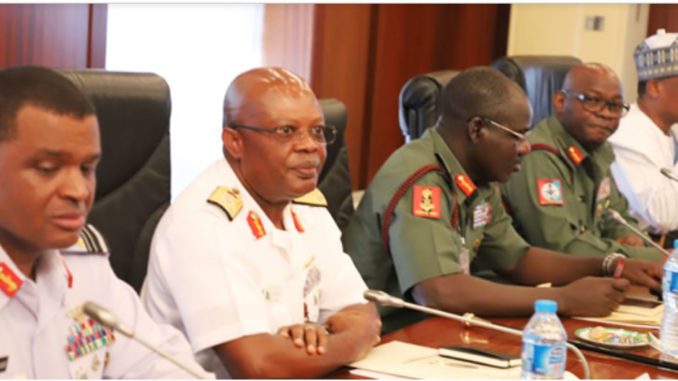
As political contenders deploy their arsenal ahead of the 2019 elections, security challenges, some of which threaten the very existence of the Nigerian union, should be at the centre of political discourse again. Kaduna State is once more on the recurring boil of sectarian and communal violence; Boko Haram terrorists are slaughtering and ambushing troops; kidnappers, armed robbers and criminal gangs are active and militants are still vandalising infrastructure in the Niger Delta region. When added to the rampage of herdsmen terrorists across many states, the electorate should for once, shun base sentiments and demand concrete plans for making Nigeria safe from office seekers at all levels.
Nigerians must retake their destiny and shape their future by forcefully making their voices and concerns heard through the ballot and end the tyranny of a political class that is so disconnected from the people, plundered the treasury, ruined the economy and maintained the dysfunctional unitary federalism they inherited from the military which has fostered insecurity and lawlessness.
Since 1999, incompetence underlines all the regimes and today, Nigeria is on the brink. One President, through weakness and systemic corruption, allowed terrorism to birth; another, by cronyism and sectionalism, allowed Fulani herdsmen terrorism to flourish and threaten national cohesion. The two others hardly cared either. Once thought to have been de-fanged, Boko Haram terrorists have recovered enough to control isolated settlements, render some highways impassable and mount daring assaults on towns and military garrisons. They sacked and razed a number of communities last week, killing over 50 and executing another aid worker. Just within 10 weeks into 2018, Fulani militia had murdered over 1,300 persons: Governor Samuel Ortom said 1,800 persons were killed in Benue State by herdsmen between 2013 and 2016; Global Terrorism Monitor considers Fulani herder-terrorism Nigeria’s second biggest threat to peace. Reprisals by local militias especially in Plateau and Benue States have created an unprecedented state of anarchy. Between them, Boko Haram and Fulani militants have created over 2.5 million internally displaced persons: IDPs in the six North-East states rose by 4.5 per cent in the 12 months to January 2018, according to the National Population Commission.
Piracy in Nigeria’s coastal waters is rated the world’s sixth worst by Marine Insight, with 36 actual and attempted attacks in 2016 and 33 in 2017 as recorded by Statista, an online portal. The Nigeria Police reported 1,777 cases of kidnapping in the year to April 2017 and arrested 1.347 suspects. But many cases are never reported.
Really, Nigerians are under siege: armed robbers operate in many states; militants and vandals continue to sabotage oil and gas, power and telecommunications infrastructure and run illegal refineries; thugs and transport unions frequently hold major cities to ransom and street gangs and cults go on the rampage at will, including within the hallowed walls of higher institutions of learning. The nation’s top security chiefs have just raised the alarm on the proliferation of arms, a long-running problem, exacerbated by the massive importation of firearms and ammunition by politicians ahead of the 2019 elections. Political party rallies, primary selections and elections are security nightmares, hardly abated by massive deployment of security personnel.
Now is the time to break the inertia of successive governments. Above all else, anyone aspiring to be president or governor must, unambiguously, commit himself to work with all stakeholders to actualise the establishment of state police. Since the parliaments are essential to the constitution amendment process, voters should know where every aspiring federal and state legislator stands on the issue.
Nigerians need a president who will match words with action: not unfulfilled promises by successive regimes to deploy the 80 per cent of police personnel, which Rasheed Akintunde, an assistant inspector-general of police, revealed to be attached to individuals, back to normal police duties. The candidates should tell voters what they intend to do with the 150,000 policemen that the Police Service Commission admits, are personal guards to VIPs and unauthorised persons.
No federal polity relies on a single police force. Belgium has a federal and 188 local police agencies, with the latter in charge of law enforcement in cities and counties; Australia’s six states and two federal territories each has its own police force, while local governments and cities also have policing units; Switzerland’s 26 cantons bear primary responsibility for law enforcement, while the big cities also have independent municipal police forces. Mexico has two federal police forces, 31 state police forces and 1,600 municipal police agencies.
We need a President who will, pending constitution amendment, agree to immediate reforms of the security system. Police should be decentralised, disciplined, incorruptible and deployed to protect all: they are not for private guard duties. We need a President and federal lawmakers with an agenda to overhaul the security agencies to meet today’s challenges. The overhaul of the United States intelligence structure after 9/11 was as much an executive action as it was a Congressional initiative.
Candidates and parties must spell out their plans to make Nigeria safe for citizens, investments, production and job creation in well-articulated policy documents with timelines and implementation road maps.
END

Be the first to comment